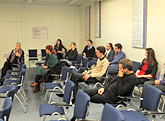 The Hague, 1 November 2013
The Hague, 1 November 2013
A week-long study visit to the ICTY by a group of eight journalists from Bosnia and Herzegovina, Croatia and Serbia concluded today.
The key element during the final day of the visit was a roundtable discussion on the challenges of reporting on war crimes trials, during which the regional journalists discussed different approaches to the subject with reporters from the BBC, the Institute for War and Peace Reporting (IWPR) and the Beta news agency. In spite of the many difficulties journalists who report on war crimes trials are faced with, the general conclusion was that the future of war crime reporting was 'not bleak', although all those assembled agreed with the BBC’s Anna Holligan when she suggested that “journalists should continue to find new perspectives from which to view such tedious legal proceedings”.
The highlights of the visit, according to many of the journalists, were the meetings with the ICTY principals, President Theodor Meron and Prosecutor Serge Brammertz.
‘This visit was a very useful opportunity for reporters to get to know the work of the Tribunal and talk to its highest leadership, and could contribute towards clarification of misunderstandings which surrounds the Tribunal in the region,” said Balkan Investigative Reporting Network (BIRN) journalist Erna Mačkić.
Aleksandar Roknić, journalist of the Belgrade daily Danas said that the opportunity to meet and talk to the ICTY's President and Prosecutor was very important. "My conversation with the ICTY's President Theodor Meron was especially interesting because he was very open for conversation and presented us a wider insight into the functioning of the international justice in the framework of an institution such as the Tribunal".
Over the course of the week, the journalists also had the opportunity to meet with representatives of the Tribunal’s Communications Service, Victims and Witnesses Section, the commanding officers of the ICTY Detention Unit, Prosecution and Defence lawyers, as well as a legal officer from the Mechanism for International Criminal Tribunals.
The evaluation forms completed by the journalists at the end of the visit were full of positive comments, with many saying that the visit had provided them with extremely useful practical advice and assistance regarding reporting on proceedings at the Tribunal.
The visit was organised by the ICTY Outreach Programme in cooperation with BIRN, a longstanding Outreach partner in the region of the former Yugoslavia.

